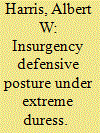|
|
|
Sort Order |
|
|
|
Items / Page
|
|
|
|
|
|
|
| Srl | Item |
| 1 |
ID:
150892


|
|
|
|
|
| Summary/Abstract |
The traditional energy utility business model is under pressure, and energy services are expected to play an important role for the energy transition. Experts and scholars argue that utilities need to innovate their business models, and transform from commodity suppliers to service providers. The transition from a product-oriented, capital-intensive business model based on tangible assets, towards a service-oriented, expense-intensive business model based on intangible assets may present great managerial and organizational challenges. Little research exists about such transitions for capital-intensive commodity providers, and particularly energy utilities, where the challenges to servitize are expected to be greatest. This qualitative paper explores the barriers to servitization within selected Swiss and German utility companies through a series of interviews with utility managers. One of them is ‘asset transformation’, the shift from tangible to intangible assets as major input factor for the value proposition, which is proposed as a driver for the complexity of business model transitions. Managers need to carefully manage those challenges, and find ways to operate both new service and established utility business models aside. Policy makers can support the transition of utilities through more favorable regulatory frameworks for energy services, and by supporting the exchange of knowledge in the industry.
|
|
|
|
|
|
|
|
|
|
|
|
|
|
|
|
| 2 |
ID:
125833


|
|
|
|
|
| Publication |
2013.
|
| Summary/Abstract |
The electric power sector stands at the beginning of a fundamental transformation process towards a more sustainable production based on renewable energies. Consequently, electric utilities as incumbent actors face a massive challenge to find new ways of creating, delivering, and capturing value from renewable energy technologies. This study investigates utilities' business models for renewable energies by analyzing two generic business models based on a series of in-depth interviews with German utility managers. It is found that utilities have developed viable business models for large-scale utility-side renewable energy generation. At the same time, utilities lack adequate business models to commercialize small-scale customer-side renewable energy technologies. By combining the business model concept with innovation and organization theory practical recommendations for utility mangers and policy makers are derived.
|
|
|
|
|
|
|
|
|
|
|
|
|
|
|
|
| 3 |
ID:
179689


|
|
|
|
|
| Summary/Abstract |
Electric retail rate design is relevant to utilities, customers, and regulators as retail rates impact the utility's revenue as well as the customers' electricity bills. In California, regulators approve rate proposals by privately owned vertical integrated utilities. Approval, however, is subject to compliance with multiple, potentially conflicting objectives such as economic or environmental objectives. Additionally, retail rates are price signals that affect how customers use electricity services. When utility customers change their usage, they also impact the ratemaking objectives to which rates have been designed. This suggests a feedback loop, which is particularly pronounced with prosumers, as they can systematically optimize their interactions with the electricity system. Prevalent ratemaking methods may not deliver retail rates that are optimal for multiple objectives when customers are prosumers. We propose a novel ratemaking method that formalizes the problem of designing retail rates as a multi-criteria optimization problem and accounts for prosumer reactions through a simulation-based optimization approach. Through a fictive case study, we found that the resulting Pareto frontiers are useful in recognizing and balancing tradeoffs among conflicting ratemaking objectives. Additionally, our results indicate that prevailing retail rates in California are not Pareto optimal.
|
|
|
|
|
|
|
|
|
|
|
|
|
|
|
|
| 4 |
ID:
139219


|
|
|
|
|
| Summary/Abstract |
Insurgent guerrilla groups are on occasion faced with difficult decisions: whether and when to become a conventional force, and whether to defend an operational base or fixed site. Standard doctrine suggests that to achieve state capture or acquire autonomous status apart from a central authority, the ability to successfully engage in conventional warfare may became necessary. A conventional force must be capable of defending territory, a defined space. Accompanying the decision to defend territory is a certain level of risk. This article examines the decision by four insurgent organizations to defend ‘operational hubs’, territory deemed worthy of a defense. The analysis herein submits that in insurgent warfare the utility of the territory being defended often supersedes the likelihood of a successful defense, on occasion generating negative outcomes for the insurgent forces.
|
|
|
|
|
|
|
|
|
|
|
|
|
|
|
|
|
|
|
|
|